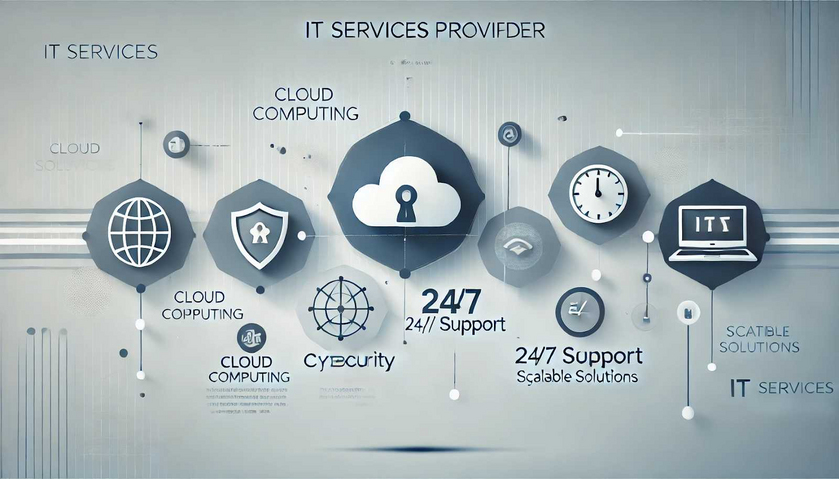In today’s technology-driven world, the right IT services provider can be a key strategic partner for your business. Whether you're running a small business with limited in-house tech expertise or overseeing a growing company that needs to scale its systems quickly, choosing the right provider isn’t just about solving problems—it’s about driving long-term success.
But with so many options available, how can a business owner cut through the noise and identify the right IT services provider? This guide outlines the essential traits, capabilities, and red flags to help you make a smart, informed decision.
1. A Proven Track Record with Businesses Like Yours
Not all IT needs are created equal. A provider that specializes in enterprise-level cybersecurity may not be a great fit for a small e-commerce business with remote workers. Look for an IT services provider with experience in your industry, business size, and technology stack.
Ask for case studies, client references, or reviews from similar businesses. These real-world examples will show how the provider approaches challenges like your own and whether they’ve helped clients achieve measurable results.
Questions to ask:
Have you worked with businesses in my industry?
Can you provide examples of similar projects or challenges you’ve handled?
2. Comprehensive Service Offerings
An ideal IT services provider offers more than just troubleshooting. You want a partner who can support your business holistically. This means services that span the full IT lifecycle—from strategic planning and cybersecurity to hardware procurement, cloud migrations, help desk support, and disaster recovery.
Even if you don’t need all of these services right now, it’s beneficial to work with a provider who can scale with your business. A company that grows with you reduces the need to re-onboard new vendors down the road.
Look for providers who offer:
24/7 help desk support
Network and infrastructure management
Cloud services and data backup
Cybersecurity and compliance consulting
Strategic IT planning and consulting
3. Responsiveness and Customer Service
When something goes wrong, you need fast, effective support. Downtime is costly, both financially and in terms of reputation. An IT services provider should prioritize your business by responding quickly and resolving issues efficiently.
Responsiveness isn’t just about speed—it’s also about clarity and communication. The provider should explain complex issues in plain language, set realistic expectations, and keep you informed throughout the process.
Signs of strong customer service:
Clearly defined SLAs (Service Level Agreements)
A dedicated point of contact or account manager
Transparent communication and regular check-ins
4. Emphasis on Security and Compliance
Cybersecurity threats are growing more sophisticated—and small to midsize businesses are often prime targets. A quality IT services provider should take security seriously and help protect your systems, data, and customer information.
They should also be familiar with the regulatory requirements specific to your industry, whether that’s HIPAA, PCI-DSS, or GDPR. A provider that understands compliance can help you avoid costly penalties and reputational damage.
Key security capabilities to expect:
Network monitoring and intrusion detection
Data encryption and secure backups
Employee training and phishing simulations
Compliance audits and documentation support
5. Customized Solutions, Not Cookie-Cutter Packages
Every business is unique, and your IT strategy should reflect that. Avoid providers who push one-size-fits-all packages without assessing your actual needs. The best IT services providers will begin the relationship by conducting a full assessment of your current infrastructure and business goals.
This tailored approach ensures that your IT setup is efficient, cost-effective, and aligned with your company’s direction.
Red flag: If a provider doesn’t ask questions about your business goals or current setup before offering a quote, they’re not offering a customized solution.
6. Scalability and Future-Readiness
Technology moves fast. Your IT services provider should help your business stay ahead of the curve, not struggle to keep up. That means offering scalable solutions and forward-thinking strategies that align with your long-term goals.
Whether you’re planning to open new locations, support a remote workforce, or adopt AI tools, your provider should have the expertise to guide and support your evolution.
Ask about:
How they handle client growth and changing needs
Emerging technologies and how they’re integrating them
Ongoing education and certifications for their team
7. Transparent Pricing and ROI Focus
Cost is always a factor—but it’s not just about finding the cheapest provider. Instead, look for an IT services provider who delivers real value for your investment. They should be able to clearly explain what you're paying for and how their services will help you save money, increase efficiency, or reduce risk over time.
Avoid unclear pricing models or unexpected fees. Ideally, your provider will offer a monthly or annual service agreement that fits your budget and offers predictability.
Key considerations:
Transparent pricing breakdowns
Flexible service tiers
A clear value proposition tied to business outcomes
Final Thoughts
Selecting an IT services provider is more than just a business transaction—it’s a partnership. The right provider will not only keep your systems running but also help you make smarter decisions, improve your security posture, and position your company for future growth.
As a business owner, doing your due diligence upfront can save you time, money, and headaches down the road. Look for a provider who understands your needs, communicates clearly, and brings a proactive approach to solving challenges.
When you find that partner, you’ll gain more than just IT support—you’ll gain a strategic ally in your business success.




















